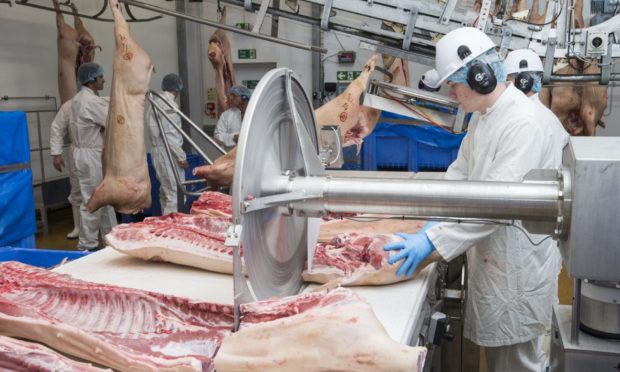Almost half of all staff working in Scottish red meat companies are foreign nationals, according to a new report.
The latest Red Meat Industry Profile from red meat levy body Quality Meat Scotland (QMS) reveals 47% of staff working at abattoirs and meat processing companies in Scotland hail from outside the UK.
QMS said this highlighted the sector’s reliance on access to skilled foreign labour – an issue highlighted in recent weeks with meat processors warning of problems supplying pigs in blankets at Christmas due to staffing shortages.
In its report, which covers 2020, QMS said: “Employment in red meat processing has been relatively stable over the year as a whole, leading to higher spending on wages and salaries, but a number of processing businesses faced considerable recruitment challenges, exacerbated by the exit from the EU.”
It estimated 3,000 people worked across 21 red meat abattoirs in Scotland during the year, and primary red meat processing generated £815 million of revenue and paid more than £77m in salaries.
Earlier this month the British Meat Processors Association (BMPA) warned post-Brexit labour shortages in abattoirs and meat plants could lead to products being in short supply.
BMPA chief executive Nick Allen blamed the UK Government’s immigration policies for staffing challenges, and said that on average BMPA members are around 12%-13% short on staff.
The Scottish Association of Meat Wholesalers (SAMW) also said it had been warning about labour shortages for the past few months.
The association’s executive manager, Martin Morgan, said: “The current truth is that the UK Government’s immigration rules are stifling our industry’s ability to recruit the number of skilled staff we require to meet retail and consumer demand.
“The end result, as we see it today, is that there will be a shortage of product on supermarket shelves over the next few months, especially during the Christmas and New Year period.”
A UK Government spokeswoman said: “We have a highly resilient food supply chain and well-established ways of working with the food sector to address food supply chain disruptions.
“We recently announced a package of measures to help tackle the HGV driver shortage, including plans to streamline the process for new drivers to gain their HGV licence and to increase the number of driving tests able to be driven by industry.”
She added: “We have no plans to introduce a short-term visa for HGV drivers. Employers should invest in the UK domestic workforce instead of relying on labour from abroad.”
Meanwhile, the QMS report also found total farm output from cattle, sheep and pig production was up 2% last year to £1.29bn, from £1.26bn.
This represented 37% of Scotland’s agricultural output, with the beef sector alone accounting for 24% of total output.
QMS senior economics analyst, Iain Macdonald, said the sector was not only reliant on its foreign neighbours for labour, but also for sales.
He said markets in the rest of the UK and the EU were especially important for the Scottish sheep sector, as sheep meat production in Scottish abattoirs is 220% of local consumption, while on-farm production is 536% of that consumed by Scots.

